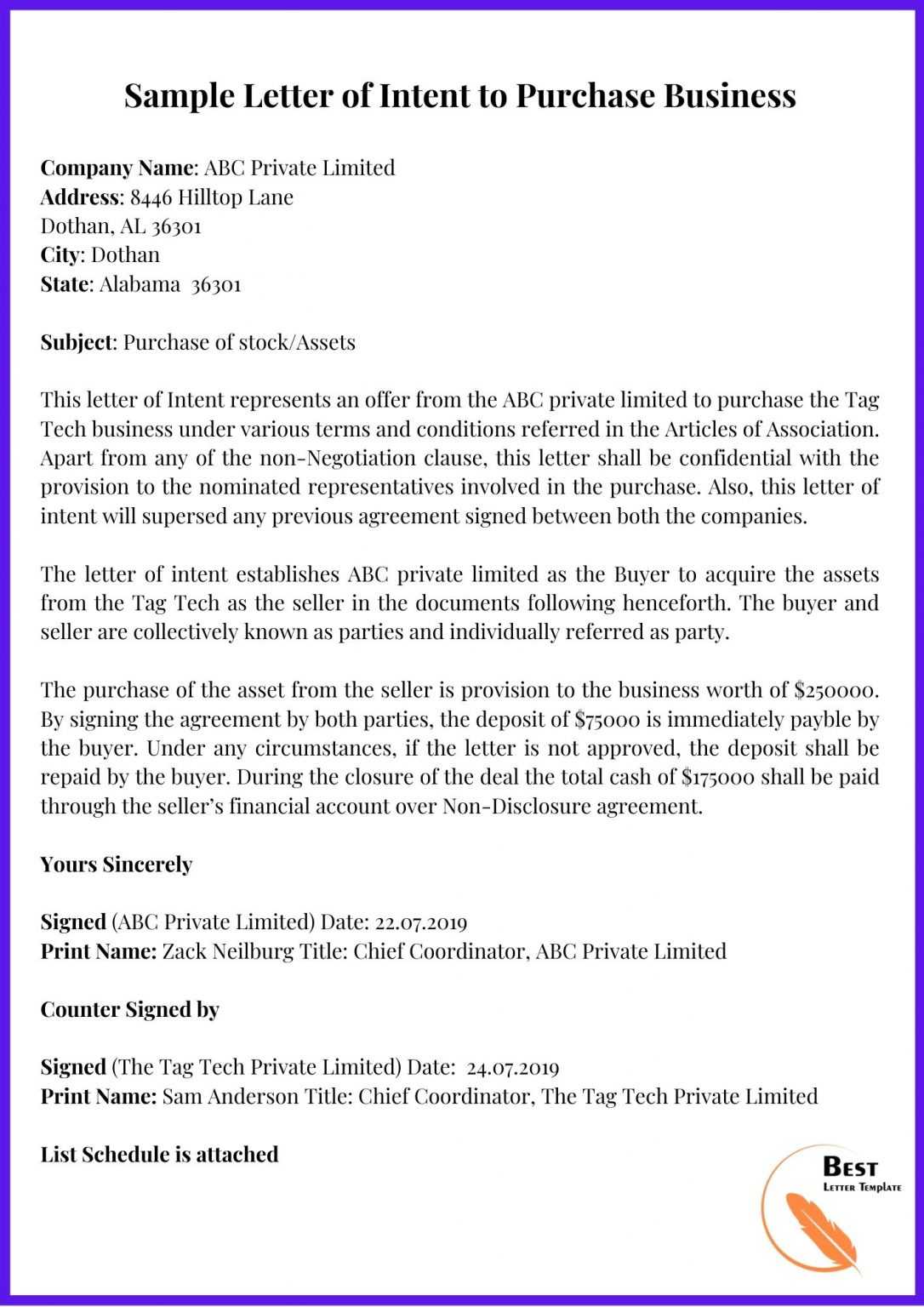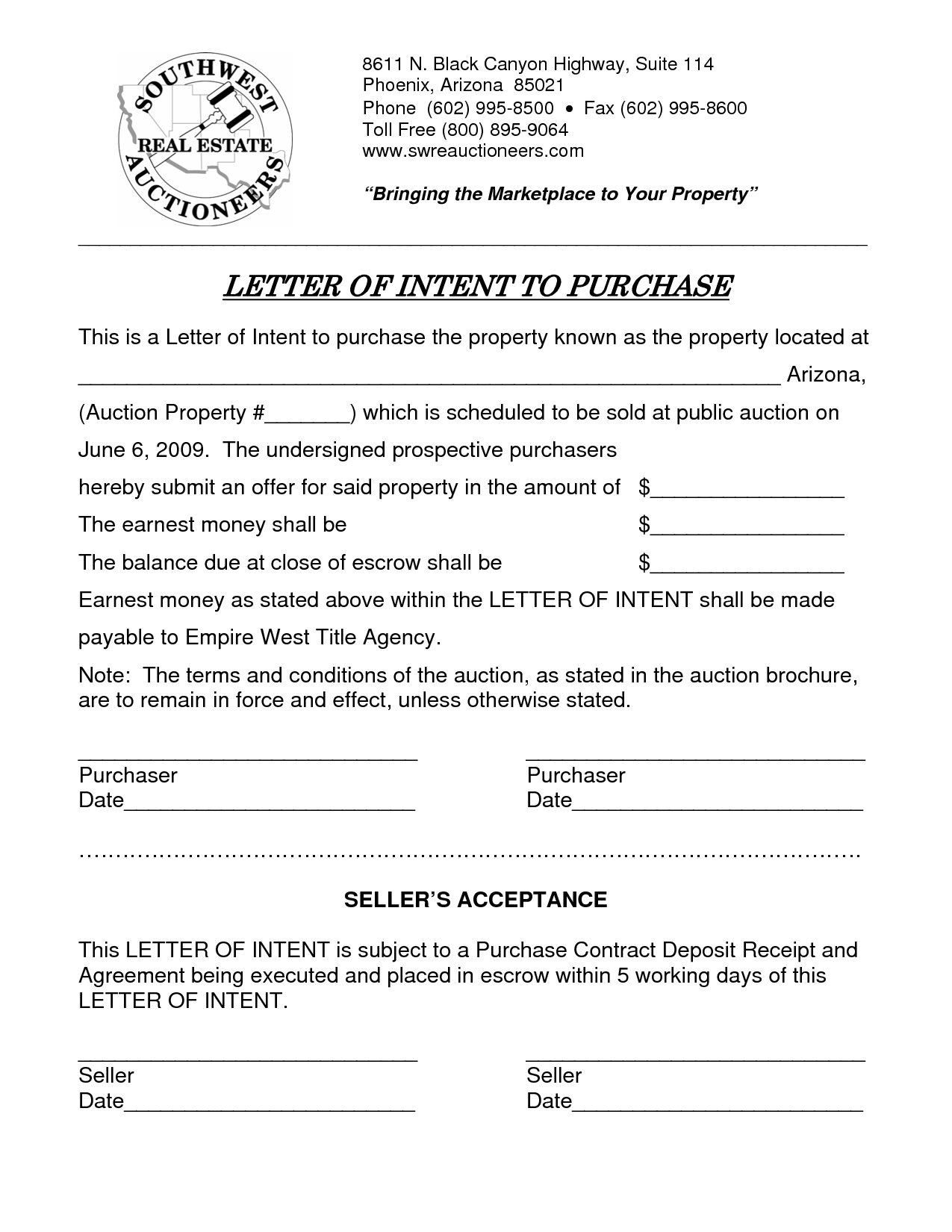The dream of owning your own home is something many of us hold dear. But the journey to that dream can be filled with twists and turns, especially in today’s competitive real estate market. One of the crucial steps in this journey is submitting a strong Letter of Intent (LOI). This document serves as a formal declaration of your serious interest in purchasing a property and sets the stage for successful negotiations.

Image: ezddies.com
Imagine yourself finally finding the perfect place: a charming cottage nestled in the countryside, a spacious modern apartment overlooking a bustling cityscape, or a sprawling family home with a backyard perfect for summer barbecues. The excitement is palpable, but it’s important to approach the next steps with clarity and strategy. A well-crafted Letter of Intent helps you stand out from other potential buyers, demonstrating your commitment and setting the foundation for a smooth and successful purchase.
Understanding the Power of a Letter of Intent
In a nutshell, a Letter of Intent (LOI) is a non-binding agreement that outlines the key terms of a proposed real estate purchase. It’s a formal way of expressing your interest and commitment to buying a specific property. While it’s not legally binding, it establishes a foundation for negotiation and demonstrates your seriousness as a buyer.
Think of it as a prelude to the official contract – a sign of good faith and a stepping stone towards finalizing the deal. The LOI provides a framework for the major points of the sale, including the price, financing terms, closing date, and any contingencies. It serves as a starting point for further discussion and ultimately allows both parties to get a better understanding of the potential deal before advancing to the final contract stage.
Key Components of a Letter of Intent
A robust Letter of Intent includes all the essential elements that outline the terms of the proposed purchase. These elements are carefully crafted to portray your seriousness as a buyer and set the stage for a successful negotiation. Let’s dive into these key components:
Firstly, a comprehensive LOI clearly states the property you intend to purchase. Include the full address and legal description of the property to leave no room for ambiguity. It’s crucial to ensure everyone involved is on the same page regarding the specific property in question.
Secondly, a compelling LOI will express your proposed purchase price. While you can always negotiate this figure later, having a starting point in your LOI demonstrates your willingness to engage in a serious discussion. Make sure you do your research and present a realistic price that reflects the current market value of the property.
Thirdly, a successful LOI will include the financing terms you intend to use for the purchase. This indicates your financial capacity and the timeline you are working with. Whether you’re obtaining a mortgage, using a cash transaction, or employing a combination of resources, be clear about your plan.
Fourthly, a well-crafted LOI should be clear regarding the closing date. This is the date by which you aim to finalize the transaction and obtain full ownership of the property. Collaborate with your real estate agent and financial advisors to determine a realistic closing date that aligns with your personal circumstances and legal requirements.
Fifthly, a strong LOI will address any contingencies that might affect the purchase. These are conditions that must be met before the deal is finalized. Common contingencies include a home inspection, appraisal, or obtaining financing. Clearly defining these conditions clarifies expectations and protects both parties.
Sample Letter of Intent to Buy Property
To help you understand the structure and content of a Letter of Intent, here’s a sample you can adapt and use as a template:
[Your Name]
[Your Address]
[Your Phone Number]
[Your Email Address]
[Date]
[Seller’s Name]
[Seller’s Address]
Subject: Letter of Intent to Purchase Property at [Property Address]
Dear [Seller’s Name],
This letter constitutes a formal expression of my intent to purchase the property located at [Property Address], as described in the [Real Estate Listing Details].
I propose to purchase the property for the price of [Proposed Purchase Price]. I intend to finance this purchase with [Explain Financing Method]. My proposed closing date is [Desired Closing Date].
My offer is subject to the following contingencies:
- Obtaining satisfactory results from a professional home inspection.
- Obtaining a mortgage commitment from a reputable lender.
- [Other Relevant Contingencies, if any]
I am confident that I can close this transaction within [Reasonable Timeframe]. I would be happy to schedule a meeting to discuss the terms of this offer in more detail and answer any questions you may have.
Sincerely,
[Your Signature]
[Your Typed Name]

Image: templates.rjuuc.edu.np
Tips and Expert Advice for Writing a Powerful Letter of Intent
Drafting a compelling Letter of Intent is more than just filling in a template. Here are some insider tips and expert advice to help you craft a memorable and effective document:
Firstly, keep your LOI concise and easy to read. While the document should be comprehensive, it should also be straightforward and avoid jargon or legalese. Use clear and concise language that anyone can understand. A well-organized LOI with bullet points and proper formatting makes it easier for the seller and their agent to review and understand your proposal.
Secondly, emphasize your interest and ability. Include a brief statement expressing your enthusiasm for the property and your commitment to close the deal on time. If you have a strong financial position, you can mention your credit score or pre-approval letter to show you’re ready to move forward.
Thirdly, engage with the seller’s perspective. Try to understand their position and what’s important to them. For instance, if the sellers need to move quickly, adjust your closing date accordingly to demonstrate your flexibility.
Fourthly, don’t be afraid to negotiate. The LOI is just the beginning of the negotiation process. Be prepared to negotiate the price, financing terms, and any contingencies. Your real estate agent can guide you through this process.
FAQs: Understanding the Letter of Intent Process
Here are some common questions and answers to guide you through the LOI process:
Q: Do I need a lawyer to review my Letter of Intent?
A: While a lawyer isn’t always necessary for a simple LOI, it’s highly recommended. They can ensure your legal rights are protected and help you clarify any complex terms or contingencies.
Q: What happens if the seller doesn’t accept my LOI?
A: If the seller doesn’t accept your LOI, they can either counteroffer with their own terms, or they may decline your offer altogether. Just keep in mind, even if their response isn’t what you hoped for, the LOI is a valuable exercise in understanding the negotiation process.
Q: What if I need to change something in my LOI after submitting it?
A: You may need to make adjustments to your LOI, particularly if it’s not accepted as presented. But it’s important to communicate with the seller through your real estate agent. Keep in mind that altering the LOI after submitting it will require the seller to renegotiate their terms.
Sample Of Letter Of Intent To Buy Property
Conclusion
A Letter of Intent can be a powerful tool when navigating the complex world of real estate. By understanding its purpose and crafting a well-structured and compelling document, you can increase your chances of successfully purchasing your dream home. Remember, a strong LOI is a foundational element in a successful real estate transaction. It sets the stage for open communication, mutual understanding, and ultimately, a happy ending for both parties.
Are you ready to take the next step in your home buying journey? Are you excited to learn more about the finer points of crafting a Letter of Intent? Share your thoughts and questions in the comments below.






